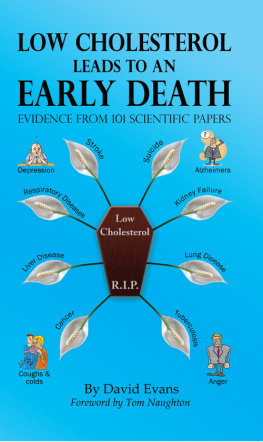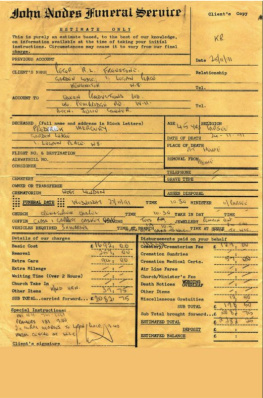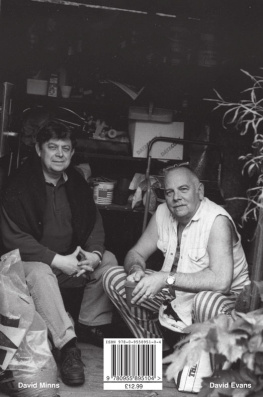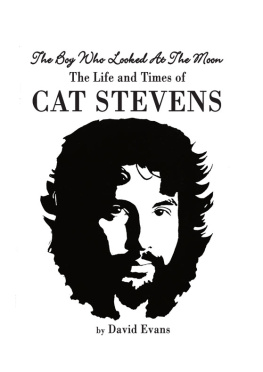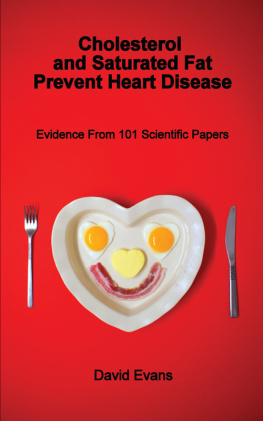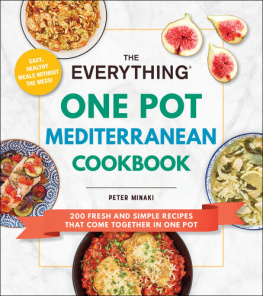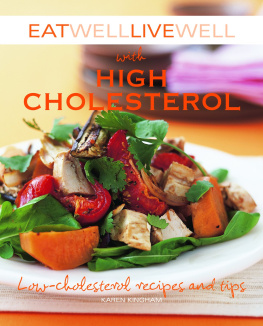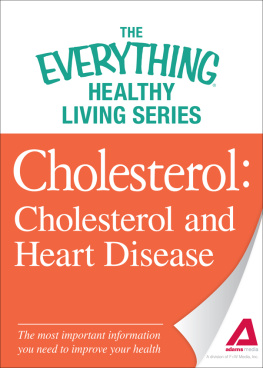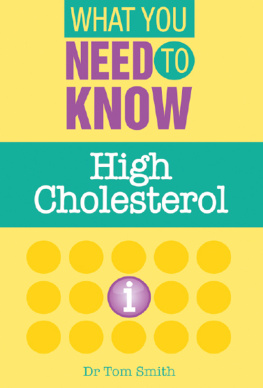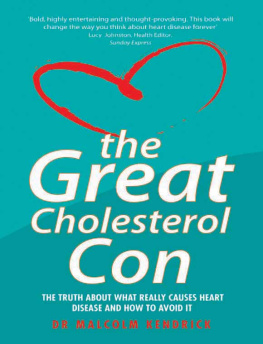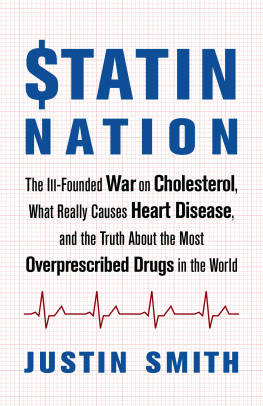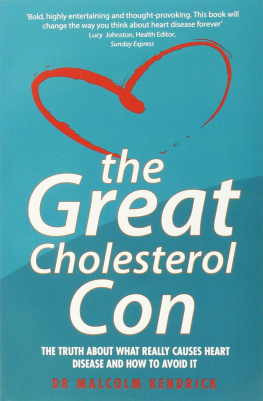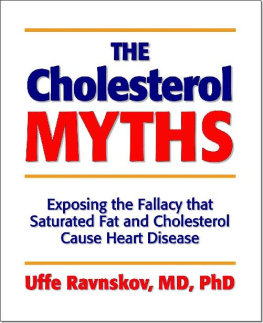
This book is dedicated to my wife Julie
for her patience and support
Also by David Evans
Cholesterol and Saturated Fat Prevent Heart Disease: Evidence From 101 Scientific Papers
Medical/liability disclaimer
This book is intended solely for informational and educational purposes and not as medical advice, nor to replace the advice of a doctor or other health-care professional. Anyone wishing to embark on any dietary or lifestyle change must first consult their health-care professional.
The decision to use any information in this book is entirely the decision of the reader, who assumes full responsibility for any and all consequences arising from such a decision. Neither the author nor the publisher shall be held liable for any consequences resulting or allegedly resulting from use of information in this book.
About the author
David is a qualified nutritional adviser. He runs a website called Healthy Diets and Science (www.dietsandscience.com) which is devoted to examining the scientific evidence regarding the effects of diet, pharmaceutical drugs & lifestyle on health. David has previously written a book examining the influence of cholesterol and saturated fat on heart disease. He is married to Julie, has four children, two step-children ages 14 to 28 and four grandchildren.
Table of contents
Foreword
by
Tom Naughton
Health writer, researcher and filmmaker
My first job after college was as a writer and editor for a small health magazine. This was in the 1980s, when the low-fat diet craze was sweeping the country after receiving a major push from the United States Department of Agriculture (USDA) and its new Dietary Guidelines for Americans. Like most other health journalists at the time, I dutifully wrote articles warning readers to lower their cholesterol levels by cutting back on saturated fat and dietary cholesterol to avoid heart disease and other horrors. Although Im a bit of a sceptic by nature, Im sorry to say it never occurred to me to question whether the sudden hysteria over killer cholesterol (as TIME magazine labelled it) was based on solid scientific evidence. I just assumed it was after all, how could the USDA, the American Heart Association, the National Institutes of Health, the Cholesterol Education Program and the revered editors of TIME magazine all be wrong? The very idea seemed absurd.
So I not only passed along the advice to lower cholesterol levels by avoiding saturated fat and cholesterol, I followed it, as well. I started eating cholesterol-free Egg Beaters (egg whites with added flavours and thickeners) or Grape Nuts cereal with skim milk for breakfast. I spread corn-oil margarine on my whole-wheat toast instead of butter. I sprayed butter-flavoured artificial toppings on my vegetables and microwave popcorn. I stirred fat-free non-dairy creamers into my coffee. By the time I was in my early 30s, I was living on a mostly vegetarian diet, never buying meat or real eggs at the grocery store and limiting myself to chicken or seafood when I ate out. My evening meals at home were usually based on rice, potatoes or pasta, just like the USDA recommended.
Of course, I felt quite virtuous eating this way which in retrospect doesnt say much about my ability to connect the dots, since my growing pride in my healthy diet was neatly matched by a shrinking energy level and growing waistline. But along the path to wearing size-38 pants, I picked up more than just extra weight. I also developed asthma, arthritis, psoriasis, numerous respiratory infections, occasional gastric reflux and frequent bellyaches. I was a travelling stand-up comedian by this time, and I always made sure to pack some Pepto-Bismol tablets before hitting the road. But hey, at least my cholesterol levels were normal.
At the time, I assumed getting a little fatter and sicker as each year passed was just part of the aging process (did I mention I was only in my 30s?). It couldnt possibly be my diet to blame, since the recognised health authorities were all recommending pretty much exactly the diet I was already following.
It wasnt until I began writing and researching my documentary Fat Head that I began to seriously question the anti-fat, anti-cholesterol advice that all the experts (or so it seemed) had been promoting for nearly three decades. My newly rediscovered scepticism was ignited by two factors. The first was the experience that comes with age. In the twenty-some additional years of living since leaving my job at the health magazine, Id seen the supposed experts in various scientific disciplines turn out to be wrong several times. I no longer assumed an impressive title rendered the bearer of it infallible. Id also become increasingly aware that researchers people Id once naively assumed to be objective seekers of scientific truth are often just as agenda-driven as the politicians and corporate executives who directly or indirectly pay their salaries. After all, should anyone be surprised to learn that the USDA whose mission is to sell grains is eager to support researchers who conclude that grains are health food?
The second and perhaps more important factor feeding my scepticism was the internet. When I was writing for a health magazine in my 20s, our research consisted largely of receiving press releases from the organisations I later dubbed The Usual Suspects: The American Heart Association, the USDA, the American Diabetes Association, the Centre for Science in the Public Interest, and the National Institutes of Health. We also kept large files of health articles clipped from major newspapers and magazines most of which got their information from The Usual Suspects. To obtain those all-important authoritative quotes for our articles, wed call doctors - who would regurgitate what theyd been told by The Usual Suspects. In other words, we were all getting our information from the same little group of gatekeepers.
In cyberspace, by contrast, the information gatekeepers are nearly non-existent. Sure, The Usual Suspects all have a major presence on the internet and still wield considerable influence, but theyre not the only game in town anymore, not by a long shot. Anyone can put up a website or a blog, and sometimes it seems that everyone has. For a researcher, the astounding breadth of information available online is a gold mine well, at least if you dont mind picking through rather a lot of garbage to find the gold nuggets.
Once I began digging into the science of diet and health while writing the script for Fat Head, I quickly discovered that not everyone was on board with the anti-fat, anti-cholesterol agenda that steamrolled its way into our national consciousness in the 1980s. There were, in fact, quite a few doctors and researchers who had always vehemently disagreed with The Usual Suspects. When the internet replaced the local library as the go-to source for information, those same doctors and researchers began putting up websites and blogs that included links to published research to bolster their arguments. In a library, youd probably never hear from those doctors and researchers unless you went looking for their work. On the internet, youre likely to trip over them by accident. I certainly did.
So there I was, attempting to write a script for a documentary about diet and health, but finding that much of the standard advice promoted by people with impressive credentials was hotly disputed by people with equally impressive credentials. Both sides cited published studies as evidence. Obviously, comparing credentials or the number of citations wasnt going to provide any clarity, so I finally did what I should have done while writing for a health magazine 25 years earlier: I taught myself to think critically about science.
Next page
